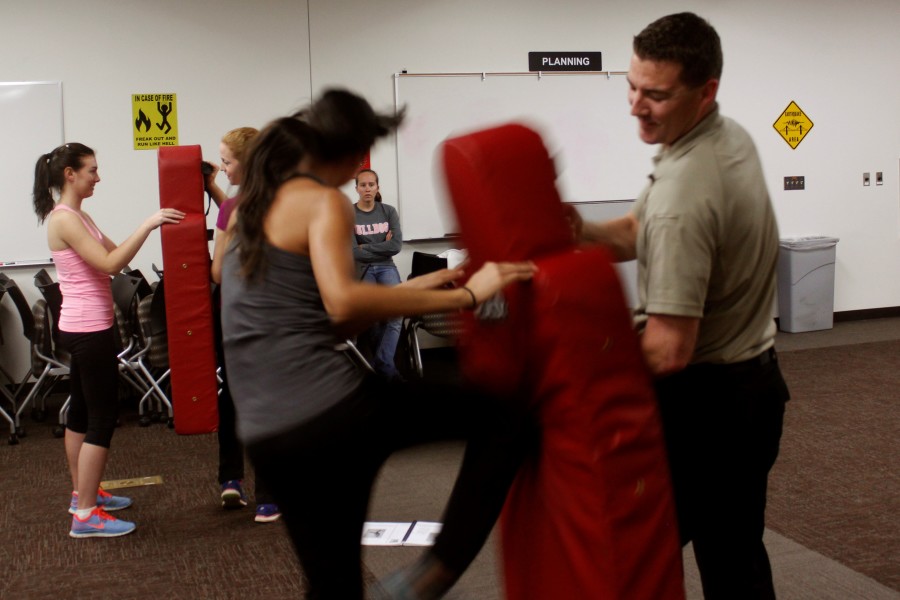By Nicole Holman & Jasmine Demers
Assistant News Editor & News Editor
CSUSM students are learning how to fight back against domestic and sexual abuse through a hands-on campus training program.
Rape Aggression Defense (R.A.D), the world’s largest self-defense program, is dedicated to teaching women practical and effective techniques to prevent assault. Courses are available to all women attending CSUSM and are taught by nationally certified defense instructors. Classes cover a range of topics, including how to react in high-risk situations and hands-on defense techniques.
R.A.D Instructor, Matthew Curran, explains the importance of adopting habits that will work to increase your personal safety.
“One of the ways women can avoid becoming targets is to always be aware of their surroundings,” Curran said. “If you feel something is out of place, act on it. Don’t ignore your gut instinct. If you feel that something is wrong or that someone is giving you a bad vibe, listen to that feeling and get yourself somewhere safe. It’s better to be safe than sorry.”
Curran also goes on to highlight the reasons why it is so important for women to take advantage of self-defense training, specifically in a college setting.
“Any female can benefit from learning how to better defend herself in high-risk situations.Their self-confidence improves and they are more aware, especially in college, where this is many students’ first time on their own and away from their parents,” Curran said.
Melissa Olmos, CSUSM student and R.A.D Training participant, explains that she wanted to take the course for reasons of self-fulfillment and practice.
“You can always improve your skills in order to catch attackers off-guard. Even if you feel that you are prepared, it’s always good to keep yourself in practice,” Olmos said.
She also goes on to explain the ways that she feels she has benefitted from the training itself, and how she plans to use it in the future.
“I feel like there’s a lot of individual growth that takes place during this training,” Olmos said. “You’re learning how to be prepared. You can also take what you learn and share it with your friends so that they can be safer, too.”
Staying safe has become an increasing concern on college campuses, with reports showing that at least one in four college women will experience sexual assault. The CSUSM campus itself has been affected by similar cases, such as the investigation of the unaffiliated fraternity, Tau Kappa Epsilon. Last semester, TKE was under investigation for multiple sexual assault allegations. Added to these reports were other criminal activities such as hazing, providing illegal drugs and alcohol to minors and vandalism. At the start of December 2014, campus police served TKE with search warrants at two different locations where they found evidence to support these allegations. According to the police report, evidence retrieved at the locations included $1,000 in cash, human growth hormones, marijuana, cocaine, LSD, ecstasy and illegal prescription drugs. They arrested two CSUSM students and TKE members after the completion of the search. The reported sexual assault cases in question still remain open and under investigation.
College campuses and students have begun taking matters into their own hands by organizing self-defense and sexual assault awareness campaigns. The newly opened H.O.P.E. (Health, Outreach, Promotion, Education) and Wellness Center offers many support programs for those who have been a victim of assault of any kind. More information on R.A.D. or any of these services are available on the H.O.P.E. and Wellness Center website.


